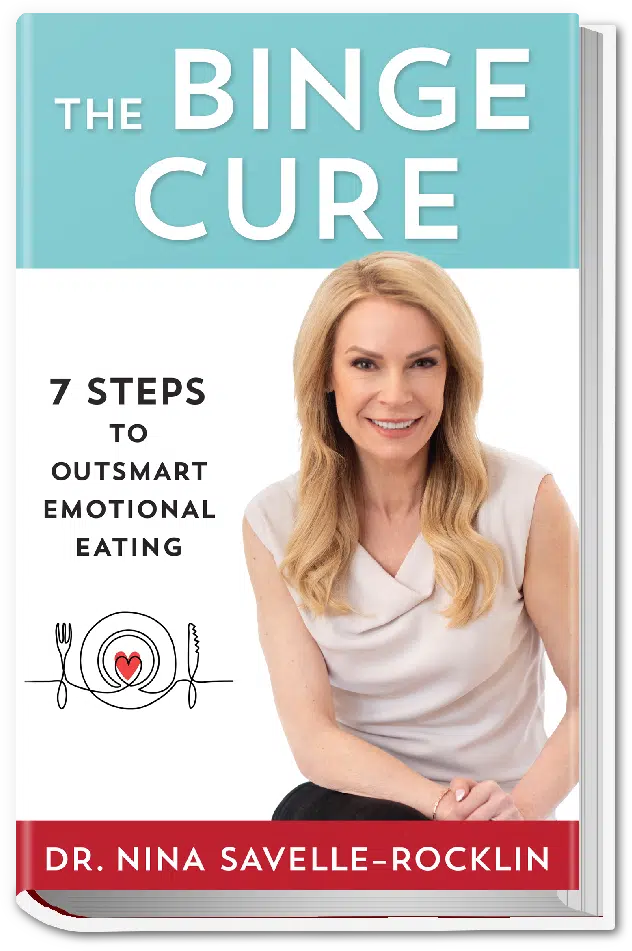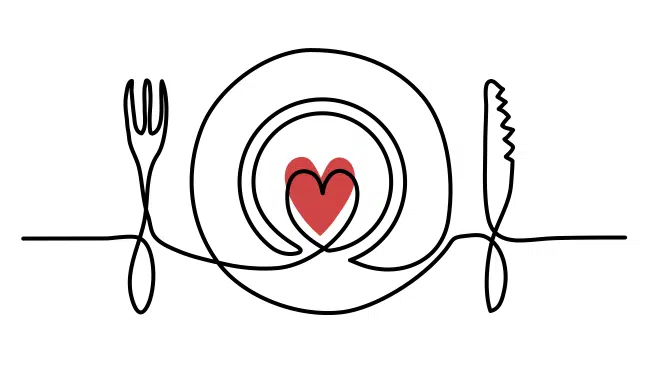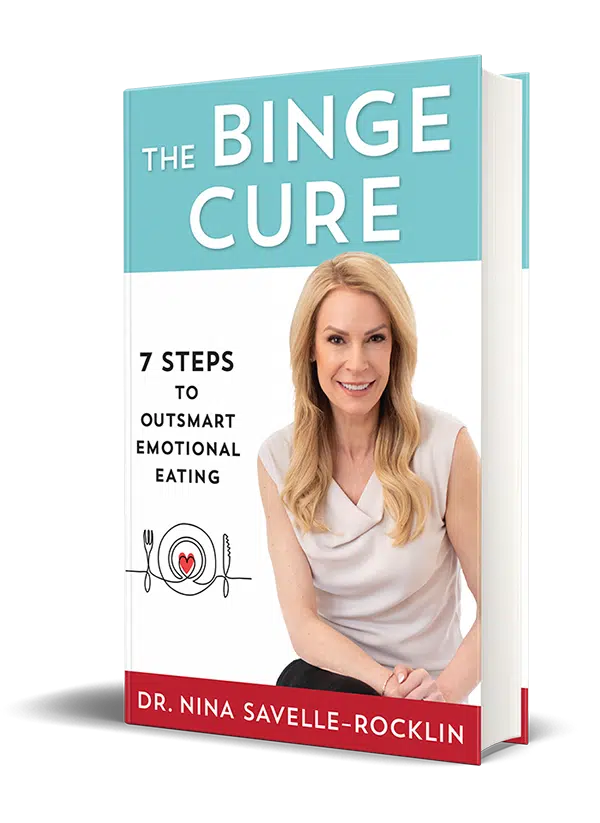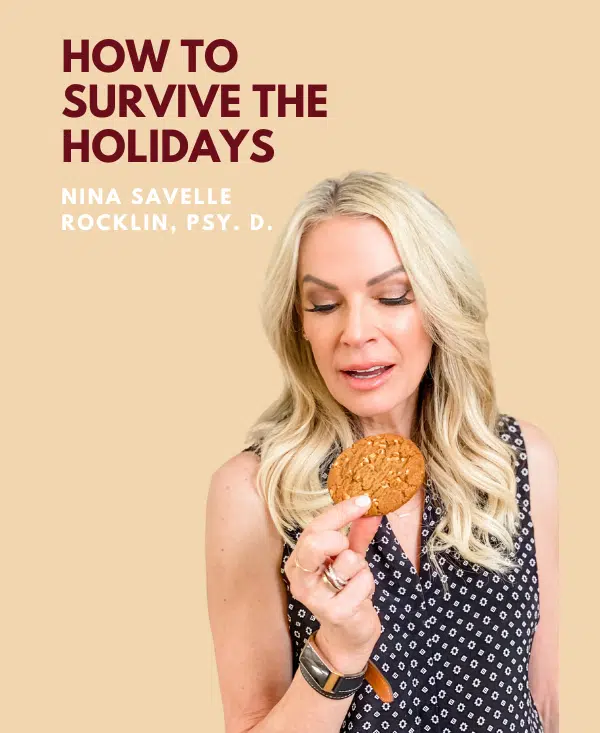Dr. Nina Savelle-Rocklin
How to Help Someone with Binge Eating Disorder: Do’s and Don’ts
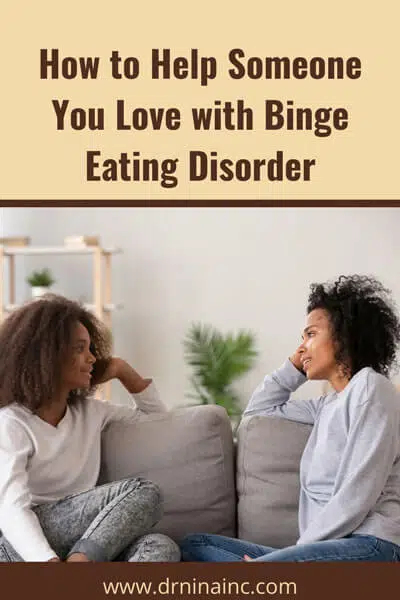
There are no quick or easy solutions on how to help someone with Binge Eating Disorder or anyone dealing with weight, food and/or body image problems. Remember that whatever is going on with food is only a symptom of the problem; the real problem is not food.
People who binge are often coping with uncomfortable or painful emotions or conflicts. They eat to comfort or distract themselves from something painful and upsetting. They can get so accustomed to eating as a way of coping that they never actually recognize the emotional trigger.
It’s important to recognize that whatever is going on with food, it’s not about willpower. While it may be tempting to focus on the eating behaviors, true support involves understanding the emotional triggers and mental health challenges underlying binge eating disorder.
From identifying signs of BED to offering empathetic, non-judgmental support, here’s what you can do to become a compassionate ally in someone’s recovery journey.
Table of Contents
- What is Binge Eating Disorder?
- Signs and Symptoms of Binge Eating Disorder
- What to DO
- Early Intervention is Important
- What NOT to DO
- How to Help Someone With Binge Eating Disorder
- Frequently Asked Questions
What is Binge Eating Disorder?
Binge eating disorder (BED) is a behavioral disorder characterized by chronic, compulsive overeating.
While it’s normal to overeat occasionally, BED is a persistent condition that disrupts mental, emotional, and physical health, making it feel like the urge to eat controls you rather than the other way around.
Here are some interesting stats about this eating disorder that show its impact.
- Prevalence: BED is the most common eating disorder in the United States, affecting an estimated 2.8 million people or about 1.2% of U.S. adults. Prevalence rates are estimated at 1.4% for females and 0.8% for males.
- Gender Differences: Unlike other eating disorders, BED affects both genders fairly equally, although it remains slightly more common in women than in men. Approximately 60% of individuals diagnosed with BED are female, and 40% are male.
- Onset Age: BED often begins in late adolescence or early adulthood, though it can develop later in life. The average age of onset is typically in the mid-20s, but it has been reported to start as early as adolescence.
- Ethnic and Socioeconomic Distribution: BED affects individuals across all racial and socioeconomic groups. Studies indicate that BED is more evenly distributed across racial/ethnic groups compared to other eating disorders, with prevalence similar among White, Black, Hispanic, and Asian populations.
- Diagnosis Rates: Despite its prevalence, BED is underdiagnosed. Studies suggest that only 43.6% of people with BED seek treatment, partly due to stigma or lack of awareness.
Here are some common myths about Binge Eating that may help you understand it better:
Signs and Symptoms of Binge Eating Disorder
People struggling with Binge Eating Disorder might feel ashamed or embarrassed about their eating habits and even go to great lengths to hide them by eating in secret.
Below are some of the most common signs and symptoms of BED that will help you find out if someone is struggling with this eating disorder.
Behavioral Symptoms of Binge Eating
People with BED may experience behavioral patterns such as:
- Unable to stop eating or control the types of food being eaten.
- Consuming large quantities of food rapidly.
- Eating even when physically full.
- Hiding or stockpiling food to consume later in private.
- Eating smaller amounts or “normally” around others, then bingeing when alone.
- Eating continuously throughout the day without planned mealtimes.
Emotional Symptoms of Binge Eating
The emotional effects of Binge Eating can be intense and may include:
- Experiencing stress or tension that only eating seems to alleviate.
- Feeling embarrassment or shame about the amount of food consumed.
- Feeling detached or numb during binge episodes, as if on autopilot.
- Never feeling fully satisfied, regardless of how much is eaten.
- Feeling guilt, self-disgust, or depression after overeating.
- Experiencing a deep desperation to control eating habits or weight.
What to DO
Binge Eating Disorder can feel isolating and overwhelming, but you can be a powerful source of strength. Helping a loved one with this disorder requires understanding, empathy, and practical assistance. Here are a few ways to help someone with an eating disorder.
It can feel overwhelming and isolating, but your support can be a great source of strength. Helping someone with BED requires empathy, understanding, and providing practical, non-judgmental assistance. Here’s how to be there for someone facing an eating disorder.
1. Arm Yourself with Knowledge
Start by educating yourself what Binge Eating Disorder really is. Familiarize yourself with its symptoms, causes, and treatment options using reliable resources like medical websites, books, and support groups.
Understanding Binge Eating is the vital first step toward true healing and support. It's not just about food—it's about the feelings beneath the surface. By educating yourself on its causes, symptoms, and effective treatment strategies, you empower yourself to make a real difference.
“The Binge Cure: 7 Steps to Outsmart Emotional Eating“ offers deep insights into the emotional roots of binge eating and provides practical tools to help you or someone you care about break free from its grip.
2. Focus on Feelings and not on Behavior
If someone you know is out of control with food, there is a reason for it, which has to do with what’s eating at them, not what they’re eating.
It isn’t about willpower or control. If someone is turning “to” food, they’re turning away from something else. Instead of asking what they are eating, ask open-ended questions that delve into their thoughts, feelings, and experiences.
3. Provide Unconditional Support
Treat the person with empathy and without judgment. Let them know you care about their well-being and are there to support them unconditionally. Avoid commenting on their weight or recommending help with eating, as doing so may do more harm than good.
Supporting someone with a Binge Eating Disorder can make a meaningful impact on their journey to recovery.
Your encouragement and understanding can be invaluable while you can’t control or force their healing. Here are some ways to offer compassionate, practical support:
- Listen Without Judgment: Create a safe space for them to share their feelings. Let them know you'll listen whenever they're ready to talk.
- Avoid Focusing on Food or Weight: Instead of commenting on their eating habits or appearance, focus on their overall well-being and what's happening in their life.
- Educate Yourself: Learn about binge eating disorder to better understand what they're experiencing. This knowledge can help you offer more empathetic support.
- Respect Their Boundaries: Allow them to share at their own pace. Avoid pushing them to talk about things they're not ready to discuss.
- Encourage Self-Compassion: Remind them to be kind to themselves and that setbacks are a natural part of the healing journey.
- Take Care of Yourself: Supporting someone else can be emotionally taxing. Ensure you're also attending to your well-being so you can be there for them.
Remember, your role isn't to fix the problem but to stand beside them as they navigate their path to recovery. Your compassion and understanding can make a profound difference in their journey toward healing.
4. Use Supportive Language
When speaking to someone with BED, choose words that express your support without judgment. Acknowledge their struggles without minimizing them. Simple affirmations like, “I understand this is hard for you,” can make them feel seen and heard.
Some good questions to ask someone with binge eating disorder include:
- How can I help?
- How do you feel?
- What’s going on with you?
- How can I best support you right now?
When asked consistently, these questions can help someone turn to you for comfort instead of food.
5. Encourage Professional Help
While your support matters, professional help is essential for treating BED. Encourage them to seek guidance from a therapist, dietitian, or doctor who specializes in eating disorders.
Early Intervention is Important
Addressing Binge Eating Disorder early on can greatly improve recovery outcomes. Recognizing the signs and seeking professional support as soon as possible can help prevent the disorder from worsening and reduce related health risks, including those associated with obesity, diabetes, and heart disease.
Recognizing and Managing Relapse Triggers
Supporting someone with BED also means helping them identify and manage potential relapse triggers. Triggers can be emotional, like stress or sadness, or situational, such as gatherings with abundant food options.
Encourage them to build coping strategies and seek professional support to navigate these challenges.
What NOT to DO
When your child, partner, or close friend is undergoing treatment for Binge Eating Disorder, your support can be invaluable.
With thoughtful planning and open communication, you can learn how to connect effectively with your loved one and become a strong, supportive partner in their journey.
Often, we have the best intentions to help someone with Binge Eating Disorder but our “help” can backfire. Here are some things to avoid:
1. Don’t be the Food Police
Just don’t do it. It doesn’t help at all. Saying, “Do you think you should eat that?” or “Maybe you should make a healthier choice” only causes the person to feel judged and not want to open up to you at all.
2. Don’t be Logical
Binge eating isn’t logical. It’s psychological. Conventional diet wisdom isn’t going to help here, because bingeing is not about willpower. It’s a way of coping that hurts more than it helps.
3. Don’t say Things Like…
- “Just eat less”
- “Just eat a little bit”
- “You just need to eat less and exercise more.”
4. Don’t offer Appearance-Based Reassurance.
For instance, if a friend says that they feel fat, don’t tell them how great they look. If they are using “fat” as a way of hiding big emotions such as anxiety, depression, vulnerability, fear, and more, then these reassurances won’t help.
5. Don’t Compliment other People who’ve Lost Weight.
Although binge eating is about deeper issues than weight and food, when you comment on someone else's weight loss, that can actually trigger binge behavior by putting a focus on appearance.
How to Help Someone With Binge Eating Disorder
The ways on how to help someone with Binge eating Disorder is not an easy task. Rather than jumping to conclusions or engaging in some of the suggestions in this post, sit down and have a conversation. Help them to feel heard and find solutions together.
Looking for a resource for someone you know? Share my free Facebook group where they will find a community of supportive members who can help them along this difficult path.
Frequently Asked Questions
If you're wondering how to help someone with Binge Eating Disorder, you're not alone. Supporting a loved one who struggles with this condition can be challenging, especially when you’re unsure of the best approach.
Below are some frequently asked questions that offer guidance on how to provide compassionate and effective support.
1. What are the signs that someone might have binge eating disorder?
Binge eating disorder can be recognized by certain behaviors and feelings. Common signs include eating large amounts of food quickly, eating alone due to embarrassment, frequent attempts at restrictive diets, and feelings of guilt or disgust after eating. Additionally, people with binge eating disorder may hide food or become overly concerned with their weight and body image.
2. How can I support someone with binge eating disorder without making them feel judged?
It’s important to focus on feelings rather than behavior. Avoid making comments about food choices, weight, or appearance. Instead, ask open-ended questions like, “How can I help?” or “How do you feel?” This encourages the person to open up about their emotions and feel supported without judgment.
3. Why shouldn't I compliment someone on their weight loss if they struggle with binge eating?
Complimenting someone’s weight loss can inadvertently reinforce the idea that their worth is tied to their appearance, which may trigger binge eating behaviors. It’s more helpful to focus on how they feel and to support their overall well-being rather than their physical appearance.
4. What’s the difference between binge eating and overeating?
Overeating is consuming more food than usual on occasion, often due to hunger or special circumstances. Binge eating, however, involves eating large amounts of food quickly, often in response to emotional triggers, and is accompanied by feelings of loss of control, guilt, and shame.
7. How can I encourage someone to seek help for binge eating disorder?
Approach the conversation with empathy and understanding. Express your concern for their well-being, and suggest that they might benefit from talking to a professional who can help them explore their feelings and develop healthier coping strategies. Offer to help them find resources or accompany them to an appointment if they feel comfortable.
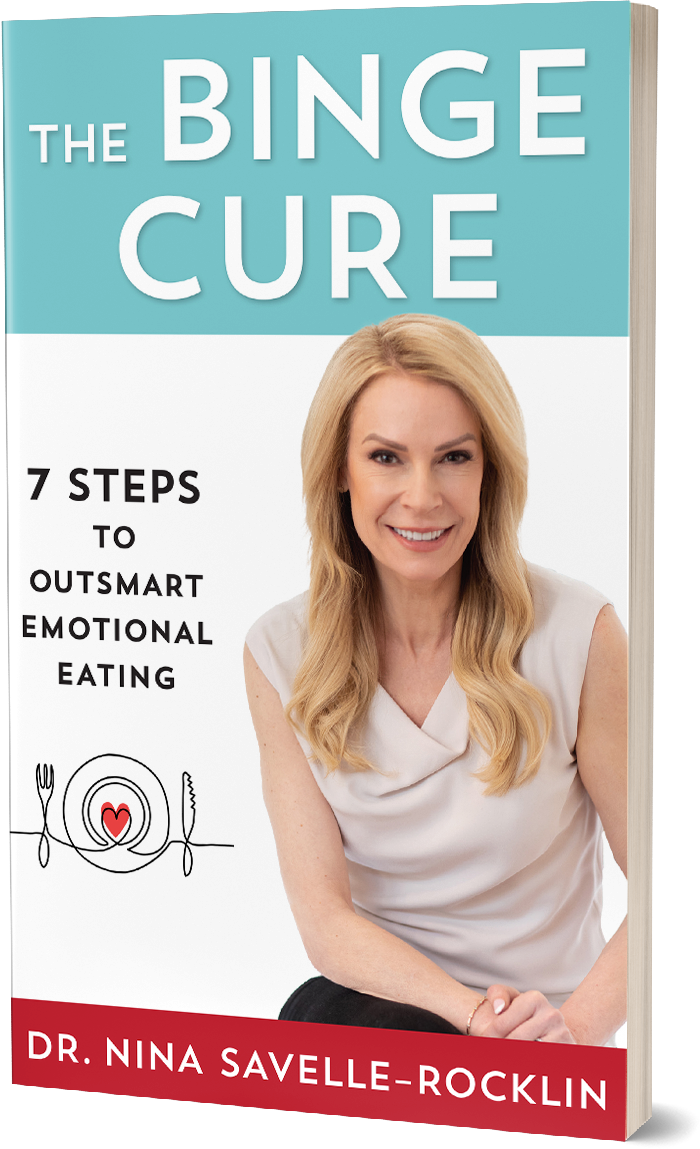
Sick of obsessing about every bite?
GET THE CURE
The Binge Cure Book!
Enter “CURE” to receive a 20% discount.
I’d love to conquer binge eating by ordering Dr. Nina’s book, The Binge Cure!
No, I don’t want access to this terrific resource to help me overcome binge eating.
The Author

Dr. Nina Savelle-Rocklin is a renowned author and podcast host and one of the nation’s leading psychoanalysts known for the psychology of eating. Her signature message of, “It’s not what you’re eating, it’s what’s eating ‘at’ you” has resonated with hundreds of thousands of listeners from around the globe in 40 countries. As founder of The Binge Cure Method, she guides emotional eaters to create lasting food freedom so they can take back control of their lives and feel good in their bodies.
Related Blogs

